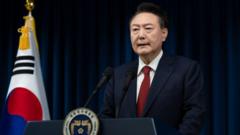South Korea's interim president Yoon Suk Yeol, who has been suspended from his duties following an impeachment for an attempted martial law order, is set to receive a 3% pay raise to approximately 262.6 million won (about $179,000). This increase comes despite his ongoing legal troubles and public outrage over the decision, particularly in light of the recent minimum wage hike of only 1.7% for the average worker.
Since Yoon's impeachment by parliament in December due to allegations of insurrection and abuse of power, he has faced mounting resistance to investigation efforts aimed at arresting him. Yoon has invoked claims of threats posed by "anti-state forces" and North Korea to defend his martial law declaration, which many observers believe was predominantly driven by his domestic political challenges.
Criticism from South Koreans regarding Yoon's pay increase has proliferated on social media, with users expressing disbelief that a suspended president receives a raise while common citizens experience relatively low wage growth. The situation remains tense, with Yoon's security detaining investigators who sought to question him, resulting in a conflicted stalemate as authorities continue to pursue an arrest warrant against him.
Further complicating the political landscape, nationwide protests are emerging both in support of and against Yoon, showcasing the divided sentiments among the populace. Supporters argue that the martial law order was a necessary measure to safeguard democracy, while opponents are calling for Yoon's complete removal from office for his actions.
In a broader context, as Yoon's acting successor Han Duck-soo also faces an impending salary increase of 3% following his own impeachment, comparisons can be drawn to better-known global leaders, such as the US President and UK Prime Minister, whose salaries remain significantly higher.
As South Korea grapples with this unprecedented political crisis, the ongoing events underscore a society deeply divided over issues of governance, accountability, and the balance of power.
Since Yoon's impeachment by parliament in December due to allegations of insurrection and abuse of power, he has faced mounting resistance to investigation efforts aimed at arresting him. Yoon has invoked claims of threats posed by "anti-state forces" and North Korea to defend his martial law declaration, which many observers believe was predominantly driven by his domestic political challenges.
Criticism from South Koreans regarding Yoon's pay increase has proliferated on social media, with users expressing disbelief that a suspended president receives a raise while common citizens experience relatively low wage growth. The situation remains tense, with Yoon's security detaining investigators who sought to question him, resulting in a conflicted stalemate as authorities continue to pursue an arrest warrant against him.
Further complicating the political landscape, nationwide protests are emerging both in support of and against Yoon, showcasing the divided sentiments among the populace. Supporters argue that the martial law order was a necessary measure to safeguard democracy, while opponents are calling for Yoon's complete removal from office for his actions.
In a broader context, as Yoon's acting successor Han Duck-soo also faces an impending salary increase of 3% following his own impeachment, comparisons can be drawn to better-known global leaders, such as the US President and UK Prime Minister, whose salaries remain significantly higher.
As South Korea grapples with this unprecedented political crisis, the ongoing events underscore a society deeply divided over issues of governance, accountability, and the balance of power.





















